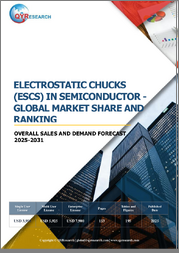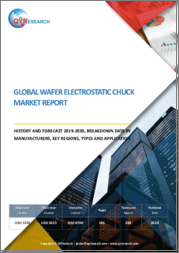
|
시장보고서
상품코드
1555602
정전척(ESC) 시장 : 세계의 산업 분석, 규모, 점유율, 성장, 동향, 예측(2024-2031년)Electrostatic Chucks (ESC) Market: Global Industry Analysis, Size, Share, Growth, Trends, and Forecast, 2024-2031 |
||||||
Persistence Market Research는 세계 정전척(ESC) 시장에 대한 자세한 조사 보고서를 발표했습니다. 이 종합적인 분석은 촉진요인, 동향, 기회 및 도전과 같은 주요 시장 역학을 상세하게 평가하고 시장 구조에 대한 귀중한 인사이트을 제공합니다.
주요 인사이트
- 정전척 시장 규모(2024년) : 18억 4,610만 달러
- 예측 시장 매출(2033년) : 31억 6, 390만 달러
- 시장 성장률(복합 연간 성장률(CAGR) 2024년-2033년) : 8.0%
정전척 시장 : 보고 범위:
정전척은 반도체 제조에 필수적인 부품으로, 에칭 및 증착과 같은 다양한 공정에서 웨이퍼를 제자리에 유지하는 데 사용됩니다. 정확성과 신뢰성은 반도체 디바이스의 품질과 성능을 보장하는데 중요한 역할을 합니다. ESC 시장에는 세라믹 및 금속으로 만들어진 특정 응용 및 기술 요구 사항에 적합한 다양한 유형의 척이 있습니다. 이 시장을 견인하고 있는 것은 첨단 반도체 디바이스 수요 증가, 일렉트로닉스 산업의 성장, ESC 기술의 지속적인 진보입니다.
시장 성장 촉진요인:
세계의 정전척 시장은 고성능 반도체 디바이스에 대한 수요 증가와 전자 분야의 확대 등 몇 가지 주요 요인들에 의해 활성화되고 있습니다. 재료 및 정밀도 향상과 같은 ESC 설계 및 제조의 기술적 진보는 효율성과 신뢰성을 높입니다. 5G, IoT, 첨단 컴퓨팅 등 신기술을 지원하기 위한 반도체 생산 증가가 시장 성장을 가속하고 있습니다. 게다가 반도체 제조업체의 R&D 투자 증가는 ESC 기술의 진화에 기여하고 있습니다.
시장 성장 억제요인:
견고한 성장이 예상되지만 정전척 시장은 제조 비용의 높이와 ESC 기술의 복잡성과 같은 여러 과제에 직면하고 있습니다. 고성능 ESC에 필요한 복잡한 제조 공정과 고급 재료는 고비용의 원인이 되어 중소 반도체 제조업체의 채용률에 영향을 미칠 수 있습니다. 또한 ESC의 정기적인 유지보수와 교정의 필요성이 운영상의 과제가 되고 있습니다. 이러한 문제를 해결하는 것은 시장 기세를 유지하고 ESC 기술의 광범위한 보급을 보장하는 데 필수적입니다.
시장 기회:
정전척 시장은 기술 발전, 반도체 생산 증가, 전자 디바이스의 보급을 원동력으로 하는 큰 성장 기회를 제공합니다. 차세대 재료 및 설계 개척과 같은 ESC 기술의 혁신은 시장 확대의 새로운 길을 나타냅니다. 첨단 제조 기술의 상승과 고정밀 용도 수요는 성장을 더욱 자극합니다. 반도체 제조업체, ESC 개발자 및 기술 공급자 간의 전략적 협력 관계는 새로운 기회를 활용하고 시장 개척을 추진하는 데 매우 중요합니다.
이 보고서에서 다루는 주요 질문
- 정전척 시장의 세계 성장을 가속하는 주요 요인은 무엇인가?
- 어떤 유형의 정전척이 각 지역에서 인기를 끌고 있는가?
- 기술의 발전은 ESC 시장 경쟁 구도에 어떤 영향을 미치는가?
- 정전척 시장의 주요 기업은 어디에서 시장의 관련성을 유지하기 위해 어떤 전략을 채택하고 있는가?
- 세계의 정전척 시장의 새로운 동향과 장래성은?
목차
제1장 주요 요약
제2장 시장 개요
- 시장 범위/분류
- 시장의 정의/범위/제한
제3장 주요 시장 동향
- 시장에 영향을 미치는 주요 동향
- 제품 혁신/개발 동향
제4장 주요 성공 요인
제5장 시장 수요 분석
- 과거 시장 수량 분석(2019년-2023년)
- 현재 및 장래 시장 규모 예측(2024년-2031년)
- 전년대비 성장 동향 분석
제6장 시장 : 가격 분석
- 지역별 가격 분석 : 제품 사이즈별
- 세계 평균 가격 분석 벤치마크
제7장 시장 수요(백만 달러) 분석
- 과거 시장 매출(백만 달러) 분석(2019년-2023년)
- 현재 및 장래 시장 매출(백만 달러) 예측(2024년-2031년)
- 전년대비 성장 동향 분석
- 절대액의 기회 분석
제8장 시장 배경
- 거시경제 요인
- 예측 요인 - 관련성과 영향
- 밸류체인 분석
- 시장 역학
- COVID-19 위기 - 영향 평가
- 규제 프레임워크
제9장 시장 분석, 제품 사이즈별
- 소개/주요 조사 결과
- 과거 시장 규모(백만 달러)와 수량 분석, 제품 사이즈별(2019년-2023년)
- 현재 및 장래 시장 규모(백만 달러)와 수량 분석과 예측, 제품 사이즈별(2024년-2031년)
- 4-6인치
- 6-8인치
- 8-12인치
제10장 시장 분석, 제품 유형별
- 소개/주요 조사 결과
- 과거 시장 규모(백만 달러)와 수량 분석, 제품 유형별(2019년-2023년)
- 현재 및 장래 시장 규모(백만 달러)와 수량 분석과 예측, 제품 유형별(2024년-2031년)
- 존슨 라벡(JR) ESC
- 쿨롱 ESC
- 시장의 매력 분석 : 제품 유형별
제11장 시장 분석, 최종 용도별
- 소개/주요 조사 결과
- 과거 시장 규모(백만 달러)와 수량 분석, 최종 용도별(2019년-2023년)
- 현재 및 장래 시장 규모(백만 달러)와 수량 분석과 예측, 최종 용도별(2024년-2031년)
- 유전체 에칭
- 도체 에칭
- 시장의 매력 분석 : 최종 용도별
제12장 시장 분석, 지역별
- 소개
- 과거 시장 규모(백만 달러)와 수량 분석, 지역별(2019년-2023년)
- 현재 시장 규모(백만 달러)와 수량 분석과 예측, 지역별(2024년-2031년)
- 북미
- 라틴아메리카
- 유럽
- 남아시아 및 태평양
- 동아시아
- 중동 및 아프리카(MEA)
- 시장의 매력 분석 : 지역별
제13장 북미 시장 분석
제14장 라틴아메리카 시장 분석
제15장 유럽 시장 분석
제16장 남아시아, 태평양 시장 분석
제17장 동아시아 시장 분석
제18장 중동 및 아프리카 시장 분석
제19장 국가별 시장 분석
- 소개
- 시장 매출 비율 분석 : 주요 국가별
- 세계 Vs. 국가별 성장 비교
- 미국 시장 분석
- 제품 사이즈별
- 제품 유형
- 최종 용도별
- 캐나다 시장 분석
- 제품 사이즈별
- 제품 유형
- 최종 용도별
- 멕시코 시장 분석
- 제품 사이즈별
- 제품 유형
- 최종 용도별
- 브라질 시장 분석
- 제품 사이즈별
- 제품 유형
- 최종 용도별
- 독일 시장 분석
- 제품 사이즈별
- 제품 유형
- 최종 용도별
- 이탈리아 시장 분석
- 제품 사이즈별
- 제품 유형
- 최종 용도별
- 프랑스 시장 분석
- 제품 사이즈별
- 제품 유형
- 최종 용도별
- 영국 시장 분석
- 제품 사이즈별
- 제품 유형
- 최종 용도별
- 스페인 시장 분석
- 제품 사이즈별
- 제품 유형
- 최종 용도별
- 베네룩스 시장 분석
- 제품 사이즈별
- 제품 유형
- 최종 용도별
- 러시아 시장 분석
- 제품 사이즈별
- 제품 유형
- 최종 용도별
- 중국 시장 분석
- 제품 사이즈별
- 제품 유형
- 최종 용도별
- 일본 시장 분석
- 제품 사이즈별
- 제품 유형
- 최종 용도별
- 한국 시장 분석
- 제품 사이즈별
- 제품 유형
- 최종 용도별
- 인도 시장 분석
- 제품 사이즈별
- 제품 유형
- 최종 용도별
- ASEAN 시장 분석
- 제품 사이즈별
- 제품 유형
- 최종 용도별
- 호주 및 뉴질랜드 시장 분석
- 제품 사이즈별
- 제품 유형
- 최종 용도별
- GCC 국가 시장 분석
- 제품 사이즈별
- 제품 유형
- 최종 용도별
- 터키 시장 분석
- 제품 사이즈별
- 제품 유형
- 최종 용도별
- 북아프리카 시장 분석
- 제품 사이즈별
- 제품 유형
- 최종 용도별
- 남아프리카 시장 분석
- 제품 사이즈별
- 제품 유형
- 최종 용도별
제20장 시장 구조 분석
- 시장 분석 : 기업 Tier별
- 주요 기업 시장 집중도와 시장 점유율 분석
- 시장현재분석
제21장 경쟁 분석
- 경쟁 대시보드
- 경쟁 벤치마킹
- 경쟁의 상세 정보
- Entegris, Inc.
- SHINKO ELECTRIC INDUSTRIES CO. LTD.
- KYOCERA Corporation
- NGK INSULATORS, LTD.
- TOTO Ltd.
- NTK CERATEC CO., LTD.
- TSUKUBASEIKO Co. Ltd.
- The SEMCO Group
- Technetics Group
- FM Industries, Inc.
- Krosaki Harima Corporation
- MiCo Co., Ltd.
- LK ENGINEERING CO., LTD.
- BOBOO Hightech Co., Ltd.
- SUMITOMO OSAKA CEMENT Co., Ltd.
- TOMOEGAWA CO., LTD.
제22장 사용된 전제조건과 약어
제23장 조사 방법
BJH 24.10.11Persistence Market Research has recently released an in-depth report on the global Electrostatic Chucks (ESCs) market. This comprehensive analysis provides a detailed evaluation of key market dynamics, including drivers, trends, opportunities, and challenges, offering valuable insights into the market structure.
Key Insights:
- Electrostatic Chucks Market Size (2024E): USD 1,846.1 MN
- Projected Market Value (2033F): USD 3,163.9 MN
- Global Market Growth Rate (CAGR 2024 to 2033): 8.0%
Electrostatic Chucks Market - Report Scope:
Electrostatic chucks are essential components in semiconductor manufacturing, used to hold wafers in place during various processes such as etching and deposition. Their precision and reliability play a crucial role in ensuring the quality and performance of semiconductor devices. The ESC market includes different types of chucks, such as ceramic and metal types, each suited to specific applications and technological requirements. The market is driven by the increasing demand for advanced semiconductor devices, growing electronics industry, and continuous advancements in ESC technology.
Market Growth Drivers:
The global electrostatic chucks market is fueled by several key factors, including the escalating demand for high-performance semiconductor devices and the expansion of the electronics sector. Technological advancements in ESC design and manufacturing, such as improvements in materials and precision, are enhancing their efficiency and reliability. The rise in semiconductor production to support emerging technologies like 5G, IoT, and advanced computing is driving market growth. Additionally, increased investments in research and development by semiconductor manufacturers are contributing to the evolution of ESC technology.
Market Restraints:
Despite robust growth prospects, the electrostatic chucks market faces several challenges, including high production costs and the complexity of ESC technology. The intricate manufacturing processes and advanced materials required for high-performance ESCs contribute to their high cost, which may impact adoption rates among smaller semiconductor manufacturers. Furthermore, the need for regular maintenance and calibration of ESCs poses operational challenges. Addressing these issues is essential for maintaining market momentum and ensuring broad adoption of ESC technology.
Market Opportunities:
The electrostatic chucks market offers substantial growth opportunities driven by technological advancements, increasing semiconductor production, and the proliferation of electronic devices. Innovations in ESC technology, such as the development of next-generation materials and designs, present new avenues for market expansion. The rise of advanced manufacturing techniques and the demand for high-precision applications further stimulate growth. Strategic collaborations between semiconductor manufacturers, ESC developers, and technology providers are crucial to leveraging emerging opportunities and driving market advancement.
Key Questions Answered in the Report:
- What are the primary factors driving the growth of the electrostatic chucks market globally?
- Which types of electrostatic chucks are gaining traction in different regions?
- How are technological advancements impacting the competitive landscape of the ESC market?
- Who are the key players in the electrostatic chucks market, and what strategies are they employing to sustain market relevance?
- What are the emerging trends and future prospects in the global electrostatic chucks market?
Competitive Intelligence and Business Strategy:
Leading players in the global electrostatic chucks market, including Shin-Etsu Chemical Co., Ltd., SCREEN Semiconductor Solutions Co., Ltd., and Tokyo Electron Limited, focus on innovation, product differentiation, and strategic partnerships to maintain a competitive edge. These companies invest in research and development to enhance ESC performance, develop new materials, and improve manufacturing processes. Collaborations with semiconductor manufacturers and technology firms are vital for market penetration and technology adoption. Emphasis on precision, reliability, and cost-efficiency supports market growth and strengthens the commercial viability of electrostatic chucks.
Key Companies Profiled:
- Entegris, Inc.
- Shinko Electric Industries Co. Ltd.
- Kyocera Corporation
- Ngk Insulators, Ltd.
- Toto Ltd.
- Ntk Ceratec Co., Ltd.
- Tsukubaseiko Co. Ltd.
- The SEMCO Group
- Technetics Group
- FM Industries, Inc.
- Krosaki Harima Corporation
- MiCo Co., Ltd.
- LK Engineering Co., Ltd.
- BOBOO Hightech Co., Ltd.
- Sumitomo Osaka Cement Co., Ltd.
- Tomoegawa Co., Ltd.
Market Segmentation
By Product Type
- Johnsen Rahbek ESCs
- Coulombic ESCs
By End Use
- Dielectric Etch,
- Conductor Etch
By Product Size
- 4-6 inches
- 6-8 inches
- 8-12 inches
By Region
- North America
- Latin America
- Europe
- South Asia & Oceania
- East Asia
- The Middle East & Africa
Table of Contents
1. Executive Summary
- 1.1. Global Market Outlook
- 1.2. Demand Side Trends
- 1.3. Supply Side Trends
- 1.4. Technology Roadmap
- 1.5. Analysis and Recommendations
2. Market Overview
- 2.1. Market Coverage / Taxonomy
- 2.2. Market Definition / Scope / Limitations
3. Key Market Trends
- 3.1. Key Trends Impacting the Market
- 3.2. Product Innovation / Development Trends
4. Key Success Factors
5. Global Market Demand Analysis 2019-2023 and Forecast, 2024-2031
- 5.1. Historical Market Volume Analysis, 2019-2023
- 5.2. Current and Future Market Volume Projections, 2024-2031
- 5.3. Y-o-Y Growth Trend Analysis
6. Global Market - Pricing Analysis
- 6.1. Regional Pricing Analysis By Product Size
- 6.2. Global Average Pricing Analysis Benchmark
7. Global Market Demand (US$ Mn) Analysis 2019-2023 and Forecast, 2024-2031
- 7.1. Historical Market Value (US$ Mn) Analysis, 2019-2023
- 7.2. Current and Future Market Value (US$ Mn) Projections, 2024-2031
- 7.2.1. Y-o-Y Growth Trend Analysis
- 7.2.2. Absolute $ Opportunity Analysis
8. Market Background
- 8.1. Macro-Economic Factors
- 8.1.1. Global GDP Growth Outlook
- 8.1.2. Global Electronics Industry Overview
- 8.1.3. Global Consumer Electronics Market Overview
- 8.1.4. Other Key Macro-Economic Factors
- 8.2. Forecast Factors - Relevance & Impact
- 8.2.1. Global Urbanization Growth Outlook
- 8.2.2. Top Companies Historical Growth
- 8.2.3. Regulatory Impact Outlook
- 8.2.4. End Use Sectors Growth Outlook
- 8.2.5. Other Key Forecast Factors
- 8.3. Value Chain Analysis
- 8.3.1. List of Electrostatic Chucks Esc Manufacturer
- 8.3.2. List of Electrostatic Chucks Esc Suppliers
- 8.3.3. List of Key End-Users
- 8.4. Market Dynamics
- 8.4.1. Drivers
- 8.4.2. Restraints
- 8.4.3. Opportunity Analysis
- 8.5. COVID-19 Crisis - Impact Assessment
- 8.5.1. Current Statistics
- 8.5.2. World Economy / Cluster Projections
- 8.5.3. Short - Mid - Long Term Outlook
- 8.5.4. Likely Rebound Key Strategies
- 8.6. Regulatory Framework
9. Global Market Analysis 2019-2023 and Forecast 2024-2031, by Product Size
- 9.1. Introduction / Key Findings
- 9.2. Historical Market Size (US$ Mn) and Volume Analysis By Product Size, 2019-2023
- 9.3. Current and Future Market Size (US$ Mn) and Volume Analysis and Forecast By Product Size, 2024-2031
- 9.3.1. 4 - 6 Inches
- 9.3.2. 6 - 8 Inches
- 9.3.3. 8 - 12 Inches
- 9.4. Market Attractiveness Analysis By Product Size
10. Global Market Analysis 2019-2023 and Forecast 2024-2031, by Product Type
- 10.1. Introduction / Key Findings
- 10.2. Historical Market Size (US$ Mn) and Volume Analysis By Product Type, 2019-2023
- 10.3. Current and Future Market Size (US$ Mn) and Volume Analysis and Forecast By Product Type, 2024-2031
- 10.3.1. Johnsen Rahbek (JR) ESCs
- 10.3.2. Coulombic ESCs
- 10.4. Market Attractiveness Analysis By Product Type
11. Global Market Analysis 2019-2023 and Forecast 2024-2031, By End Use
- 11.1. Introduction / Key Findings
- 11.2. Historical Market Size (US$ Mn) and Volume Analysis By End Use, 2019-2023
- 11.3. Current and Future Market Size (US$ Mn) and Volume Analysis and Forecast by End Use, 2024-2031
- 11.3.1. Dielectric Etch
- 11.3.2. Conductor Etch
- 11.4. Market Attractiveness Analysis By End Use
12. Global Market Analysis 2019-2023 and Forecast 2024-2031, by Region
- 12.1. Introduction
- 12.2. Historical Market Size (US$ Mn) and Volume Analysis By Region, 2019-2023
- 12.3. Current Market Size (US$ Mn) and Volume Analysis and Forecast By Region, 2024-2031
- 12.3.1. North America
- 12.3.2. Latin America
- 12.3.3. Europe
- 12.3.4. South Asia and Pacific
- 12.3.5. East Asia
- 12.3.6. Middle East & Africa (MEA)
- 12.4. Market Attractiveness Analysis By Region
13. North America Market Analysis 2019-2023 and Forecast 2024-2031
- 13.1. Introduction
- 13.2. Pricing Analysis
- 13.3. Historical Market Size (US$ Mn) and Volume Trend Analysis By Market Taxonomy, 2019-2023
- 13.4. Market Size (US$ Mn) and Volume Forecast By Market Taxonomy, 2024-2031
- 13.4.1. By Country
- 13.4.1.1. U.S.
- 13.4.1.2. Canada
- 13.4.2. By Product Size
- 13.4.3. By Product Type
- 13.4.4. By End Use
- 13.4.1. By Country
- 13.5. Market Attractiveness Analysis
- 13.5.1. By Country
- 13.5.2. By Product Size
- 13.5.3. By Product Type
- 13.5.4. By End Use
14. Latin America Market Analysis 2019-2023 and Forecast 2024-2031
- 14.1. Introduction
- 14.2. Pricing Analysis
- 14.3. Historical Market Size (US$ Mn) and Volume Trend Analysis By Market Taxonomy, 2019-2023
- 14.4. Market Size (US$ Mn) and Volume Forecast By Market Taxonomy, 2024-2031
- 14.4.1. By Country
- 14.4.1.1. Brazil
- 14.4.1.2. Mexico
- 14.4.1.3. Rest of Latin America
- 14.4.2. By Product Size
- 14.4.3. By Product Type
- 14.4.4. By End Use
- 14.4.1. By Country
- 14.5. Market Attractiveness Analysis
- 14.5.1. By Country
- 14.5.2. By Product Size
- 14.5.3. By Product Type
- 14.5.4. By End Use
15. Europe Market Analysis 2019-2023 and Forecast 2024-2031
- 15.1. Introduction
- 15.2. Pricing Analysis
- 15.3. Historical Market Size (US$ Mn) and Volume Trend Analysis By Market Taxonomy, 2019-2023
- 15.4. Market Size (US$ Mn) and Volume Forecast By Market Taxonomy, 2024-2031
- 15.4.1. By Country
- 15.4.1.1. Germany
- 15.4.1.2. Italy
- 15.4.1.3. France
- 15.4.1.4. U.K
- 15.4.1.5. Spain
- 15.4.1.6. BENELUX
- 15.4.1.7. Russia
- 15.4.1.8. Rest of Europe
- 15.4.2. By Product Size
- 15.4.3. By Product Type
- 15.4.4. By End Use
- 15.4.1. By Country
- 15.5. Market Attractiveness Analysis
- 15.5.1. By Country
- 15.5.2. By Product Size
- 15.5.3. By Product Type
- 15.5.4. By End Use
16. South Asia and Pacific Market Analysis 2019-2023 and Forecast 2024-2031
- 16.1. Introduction
- 16.2. Pricing Analysis
- 16.3. Historical Market Size (US$ Mn) and Volume Trend Analysis By Market Taxonomy, 2019-2023
- 16.4. Market Size (US$ Mn) and Volume Forecast By Market Taxonomy, 2024-2031
- 16.4.1. By Country
- 16.4.1.1. India
- 16.4.1.2. ASEAN
- 16.4.1.3. Australia & New Zealand
- 16.4.1.4. Rest of South Asia and Pacific
- 16.4.2. By Product Size
- 16.4.3. By Product Type
- 16.4.4. By End Use
- 16.4.1. By Country
- 16.5. Market Attractiveness Analysis
- 16.5.1. By Country
- 16.5.2. By Product Size
- 16.5.3. By Product Type
- 16.5.4. By End Use
17. East Asia Market Analysis 2019-2023 and Forecast 2024-2031
- 17.1. Introduction
- 17.2. Pricing Analysis
- 17.3. Historical Market Size (US$ Mn) and Volume Trend Analysis By Market Taxonomy, 2019-2023
- 17.4. Market Size (US$ Mn) and Volume Forecast By Market Taxonomy, 2024-2031
- 17.4.1. By Country
- 17.4.1.1. China
- 17.4.1.2. Japan
- 17.4.1.3. South Korea
- 17.4.2. By Product Size
- 17.4.3. By Product Type
- 17.4.4. By End Use
- 17.4.1. By Country
- 17.5. Market Attractiveness Analysis
- 17.5.1. By Country
- 17.5.2. By Product Size
- 17.5.3. By Product Type
- 17.5.4. By End Use
18. Middle East and Africa Market Analysis 2019-2023 and Forecast 2024-2031
- 18.1. Introduction
- 18.2. Pricing Analysis
- 18.3. Historical Market Size (US$ Mn) and Volume Trend Analysis By Market Taxonomy, 2019-2023
- 18.4. Market Size (US$ Mn) and Volume Forecast By Market Taxonomy, 2024-2031
- 18.4.1. By Country
- 18.4.1.1. GCC Countries
- 18.4.1.2. Turkey
- 18.4.1.3. Northern Africa
- 18.4.1.4. South Africa
- 18.4.1.5. Rest of MEA
- 18.4.2. By Product Size
- 18.4.3. By Product Type
- 18.4.4. By End Use
- 18.4.1. By Country
- 18.5. Market Attractiveness Analysis
- 18.5.1. By Country
- 18.5.2. By Product Size
- 18.5.3. By Product Type
- 18.5.4. By End Use
19. Countrywise Market Analysis
- 19.1. Introduction
- 19.1.1. Market Value Proportion Analysis, By Key Countries
- 19.1.2. Global Vs. Country Growth Comparison
- 19.2. U.S. Market Analysis
- 19.2.1. By Product Size
- 19.2.2. By Product Type
- 19.2.3. By End Use
- 19.3. Canada Market Analysis
- 19.3.1. By Product Size
- 19.3.2. By Product Type
- 19.3.3. By End Use
- 19.4. Mexico Market Analysis
- 19.4.1. By Product Size
- 19.4.2. By Product Type
- 19.4.3. By End Use
- 19.5. Brazil Market Analysis
- 19.5.1. By Product Size
- 19.5.2. By Product Type
- 19.5.3. By End Use
- 19.6. Germany Market Analysis
- 19.6.1. By Product Size
- 19.6.2. By Product Type
- 19.6.3. By End Use
- 19.7. Italy Market Analysis
- 19.7.1. By Product Size
- 19.7.2. By Product Type
- 19.7.3. By End Use
- 19.8. France Market Analysis
- 19.8.1. By Product Size
- 19.8.2. By Product Type
- 19.8.3. By End Use
- 19.9. U.K. Market Analysis
- 19.9.1. By Product Size
- 19.9.2. By Product Type
- 19.9.3. By End Use
- 19.10. Spain Market Analysis
- 19.10.1. By Product Size
- 19.10.2. By Product Type
- 19.10.3. By End Use
- 19.11. BENELUX Market Analysis
- 19.11.1. By Product Size
- 19.11.2. By Product Type
- 19.11.3. By End Use
- 19.12. Russia Market Analysis
- 19.12.1. By Product Size
- 19.12.2. By Product Type
- 19.12.3. By End Use
- 19.13. China Market Analysis
- 19.13.1. By Product Size
- 19.13.2. By Product Type
- 19.13.3. By End Use
- 19.14. Japan Market Analysis
- 19.14.1. By Product Size
- 19.14.2. By Product Type
- 19.14.3. By End Use
- 19.15. South Korea Market Analysis
- 19.15.1. By Product Size
- 19.15.2. By Product Type
- 19.15.3. By End Use
- 19.16. India Market Analysis
- 19.16.1. By Product Size
- 19.16.2. By Product Type
- 19.16.3. By End Use
- 19.17. ASEAN Market Analysis
- 19.17.1. By Product Size
- 19.17.2. By Product Type
- 19.17.3. By End Use
- 19.18. Australia and New Zealand Market Analysis
- 19.18.1. By Product Size
- 19.18.2. By Product Type
- 19.18.3. By End Use
- 19.19. GCC Countries Market Analysis
- 19.19.1. By Product Size
- 19.19.2. By Product Type
- 19.19.3. By End Use
- 19.20. Turkey Market Analysis
- 19.20.1. By Product Size
- 19.20.2. By Product Type
- 19.20.3. By End Use
- 19.21. Northern Africa Market Analysis
- 19.21.1. By Product Size
- 19.21.2. By Product Type
- 19.21.3. By End Use
- 19.22. South Africa Market Analysis
- 19.22.1. By Product Size
- 19.22.2. By Product Type
- 19.22.3. By End Use
20. Market Structure Analysis
- 20.1. Market Analysis by Tier of Companies
- 20.2. Market Concentration and Market Share Analysis of Top Players
- 20.3. Market Presence Analysis
- 20.3.1. By Regional footprint of Players
- 20.3.2. Product foot print by Players
21. Competition Analysis
- 21.1. Competition Dashboard
- 21.2. Competition Benchmarking
- 21.3. Competition Deep Dive
- 21.3.1. Entegris, Inc.
- 21.3.1.1. Overview
- 21.3.1.2. Product Portfolio
- 21.3.1.3. Sales Footprint
- 21.3.1.4. Strategy Overview
- 21.3.1.4.1. Marketing Strategy
- 21.3.1.4.2. Product Strategy
- 21.3.1.4.3. Channel Strategy
- 21.3.2. SHINKO ELECTRIC INDUSTRIES CO. LTD.
- 21.3.2.1. Overview
- 21.3.2.2. Product Portfolio
- 21.3.2.3. Sales Footprint
- 21.3.2.4. Strategy Overview
- 21.3.2.4.1. Marketing Strategy
- 21.3.2.4.2. Product Strategy
- 21.3.2.4.3. Channel Strategy
- 21.3.3. KYOCERA Corporation
- 21.3.3.1. Overview
- 21.3.3.2. Product Portfolio
- 21.3.3.3. Sales Footprint
- 21.3.3.4. Strategy Overview
- 21.3.3.4.1. Marketing Strategy
- 21.3.3.4.2. Product Strategy
- 21.3.3.4.3. Channel Strategy
- 21.3.4. NGK INSULATORS, LTD.
- 21.3.4.1. Overview
- 21.3.4.2. Product Portfolio
- 21.3.4.3. Sales Footprint
- 21.3.4.4. Strategy Overview
- 21.3.4.4.1. Marketing Strategy
- 21.3.4.4.2. Product Strategy
- 21.3.4.4.3. Channel Strategy
- 21.3.5. TOTO Ltd.
- 21.3.5.1. Overview
- 21.3.5.2. Product Portfolio
- 21.3.5.3. Sales Footprint
- 21.3.5.4. Strategy Overview
- 21.3.5.4.1. Marketing Strategy
- 21.3.5.4.2. Product Strategy
- 21.3.5.4.3. Channel Strategy
- 21.3.6. NTK CERATEC CO., LTD.
- 21.3.6.1. Overview
- 21.3.6.2. Product Portfolio
- 21.3.6.3. Sales Footprint
- 21.3.6.4. Strategy Overview
- 21.3.6.4.1. Marketing Strategy
- 21.3.6.4.2. Product Strategy
- 21.3.6.4.3. Channel Strategy
- 21.3.7. TSUKUBASEIKO Co. Ltd.
- 21.3.7.1. Overview
- 21.3.7.2. Product Portfolio
- 21.3.7.3. Sales Footprint
- 21.3.7.4. Strategy Overview
- 21.3.7.4.1. Marketing Strategy
- 21.3.7.4.2. Product Strategy
- 21.3.7.4.3. Channel Strategy
- 21.3.8. The SEMCO Group
- 21.3.8.1. Overview
- 21.3.8.2. Product Portfolio
- 21.3.8.3. Sales Footprint
- 21.3.8.4. Strategy Overview
- 21.3.8.4.1. Marketing Strategy
- 21.3.8.4.2. Product Strategy
- 21.3.8.4.3. Channel Strategy
- 21.3.9. Technetics Group
- 21.3.9.1. Overview
- 21.3.9.2. Product Portfolio
- 21.3.9.3. Sales Footprint
- 21.3.9.4. Strategy Overview
- 21.3.9.4.1. Marketing Strategy
- 21.3.9.4.2. Product Strategy
- 21.3.9.4.3. Channel Strategy
- 21.3.10. FM Industries, Inc.
- 21.3.10.1. Overview
- 21.3.10.2. Product Portfolio
- 21.3.10.3. Sales Footprint
- 21.3.10.4. Strategy Overview
- 21.3.10.4.1. Marketing Strategy
- 21.3.10.4.2. Product Strategy
- 21.3.10.4.3. Channel Strategy
- 21.3.11. Krosaki Harima Corporation
- 21.3.11.1. Overview
- 21.3.11.2. Product Portfolio
- 21.3.11.3. Sales Footprint
- 21.3.11.4. Strategy Overview
- 21.3.11.4.1. Marketing Strategy
- 21.3.11.4.2. Product Strategy
- 21.3.11.4.3. Channel Strategy
- 21.3.12. MiCo Co., Ltd.
- 21.3.12.1. Overview
- 21.3.12.2. Product Portfolio
- 21.3.12.3. Sales Footprint
- 21.3.12.4. Strategy Overview
- 21.3.12.4.1. Marketing Strategy
- 21.3.12.4.2. Product Strategy
- 21.3.12.4.3. Channel Strategy
- 21.3.13. LK ENGINEERING CO., LTD.
- 21.3.13.1. Overview
- 21.3.13.2. Product Portfolio
- 21.3.13.3. Sales Footprint
- 21.3.13.4. Strategy Overview
- 21.3.13.4.1. Marketing Strategy
- 21.3.13.4.2. Product Strategy
- 21.3.13.4.3. Channel Strategy
- 21.3.14. BOBOO Hightech Co., Ltd.
- 21.3.14.1. Overview
- 21.3.14.2. Product Portfolio
- 21.3.14.3. Sales Footprint
- 21.3.14.4. Strategy Overview
- 21.3.14.4.1. Marketing Strategy
- 21.3.14.4.2. Product Strategy
- 21.3.14.4.3. Channel Strategy
- 21.3.15. SUMITOMO OSAKA CEMENT Co., Ltd.
- 21.3.15.1. Overview
- 21.3.15.2. Product Portfolio
- 21.3.15.3. Sales Footprint
- 21.3.15.4. Strategy Overview
- 21.3.15.4.1. Marketing Strategy
- 21.3.15.4.2. Product Strategy
- 21.3.15.4.3. Channel Strategy
- 21.3.16. TOMOEGAWA CO., LTD.
- 21.3.16.1. Overview
- 21.3.16.2. Product Portfolio
- 21.3.16.3. Sales Footprint
- 21.3.16.4. Strategy Overview
- 21.3.16.4.1. Marketing Strategy
- 21.3.16.4.2. Product Strategy
- 21.3.16.4.3. Channel Strategy
- 21.3.1. Entegris, Inc.



















